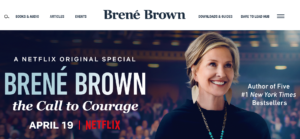Watching Brene Brown’s Netflix special about shame and vulnerability got me thinking about business leadership from her framework and analysis. She is talented, witty and insightful as well as refreshingly honest and genuine. Her work involves removing the mask that we wear at work and at home, to reveal our vulnerable selves. She shares everything, and you can tell that if you spoke privately with her, the same person would show up.

If you don’t know Brown’s work, watch her Ted Talk that touched almost 40 million people or watch her show The Call To Courage on Netflix. She is a storyteller and a researcher who dives deeply into territory that most of us like to avoid vulnerability, courage, shame, and authenticity. A quote from Teddy Roosevelt inspires one of her books Daring Greatly.
“It is not the critic who counts; not the man who points out how the strong man stumbles, or where the doer of deeds could have done them better. The credit belongs to the man who is actually in the arena, whose face is marred by dust and sweat and blood; who strives valiantly; who errs, who comes short again and again, because there is no effort without error and shortcoming; but who does actually strive to do the deeds; who knows great enthusiasms, the great devotions; who spends himself in a worthy cause; who at the best knows in the end the triumph of high achievement, and who at the worst, if he fails, at least fails while daring greatly, so that his place shall never be with those cold and timid souls who neither know victory nor defeat.” Teddy Roosevelt 1910
Vulnerable Business Leaders
Leadership in business has always been an area of interest since it requires a remarkable sense of both strength and vulnerability. Great leaders exhibit the ability to guide an organization by being self-assured. To be a trusted leader, they also need to demonstrate that they can say, wow – I screwed this up.
Finding those qualities in business professionals is rare. In my 35 plus year career in organizations, I can identify five essential things a leader must do to guide an organization and take it toward a vision.
- Stupendously honest. Most employees and colleagues have sensitive B.S. detectors. You know when a leader isn’t truthful. Of course, there are things a leader can’t share broadly with everyone in a meeting or company-wide communications. But an honest leader says it, without trying to hide that fact. They are frank, direct and don’t beat around the bush. An ability to deliver bad news or challenges highlights their strength and courage to face challenges. I see honesty as a binary choice. They either are or aren’t.
- Self-Aware – Leaders who act aloof and unaware of what’s going on are dangerous. They can create a work environment filled with doubt and suspicion. Influential leaders can say, something doesn’t feel right, are you okay. They sense a problem instead of avoiding it. They are open to feelings and don’t try and hide behind their busyness. The worse leaders are those who are emotionally wounded people and focus on themselves. The self-aware leader shows her humanity. Those who aren’t self-aware, pretend they don’t see what is in front of them.
- Constructively Challenging – It takes courage to take someone who is doing well, and to provide them with criticism. They offer advice that isn’t said to knock someone down but to give them a stepping stone to help them up another notch – that’s leadership. We all love praise, but we grow when we someone reflects a mirror toward us to say, here is a path that might work better. The opposite is also true. A great leader who knows someone has had a string of failures can still offer valuable help without dwelling on the failure, but focusing on the opportunity. The essential quality you want to celebrate is that they intend to be helpful. Many of us work to grow, to learn and to discover new ideas. A leader who can constructively challenge you makes work seem like education.
- Vulnerable in public – Great leaders often feign vulnerability in a public setting, and it’s like rotting trash – you can smell it a mile away. A truly heart-centered leader shows their weakness and knows that it deepens the bonds of trust within an organization. We want to work for human beings who can admit their mistakes, not false prophets who lead without showing themselves for who they are in private. Inspiring leaders don’t need to oversell what’s possible, but can still spread confidence throughout the team to motivate and energize a workforce. Leaders who admit that they are stumped and unsure of what to do, open themselves up to have their team help find solutions. Collaboration is vital in building consensus, but ultimately a leader has to be decisive in picking a strategy to execute.
- Inspiration through Example – We want to follow people whose actions go beyond the ease of the cliché and ordinary business dribble. People line up to support leaders because they see the sincerity in their acts that they observe in plain sight. The leader who can walk through a manufacturing plant or shipping dock and know the names of every person they meet always impresses me. That attention to personal details demonstrates that they care enough about people without having to speak a word about caring about people. Do don’t say. The best leaders encourage you to work hard and to bring the full power of your creativity to projects. The worse ones instill fear and doubt. People quit and leave companies because of bosses who intimidate and make you fear their anger. Life is too short to put up with malignant leadership who poison the culture with their own toxicity.
The vulnerable leader exists, but she isn’t easy to find. The pressures within organizations make the politics of work emotionally draining. Honest, inspiring leadership is rare but exists. The great leader makes you not only a better business person but a better person.
What have I missed from this list of attributes of vulnerable leaders who have inspired you?
You can set up a time to chat with me about your marketing challenges using my calendar. Email me jeffslater@themarketingsage.com Call me. 919 720 0995. The conversation is free, and we can explore if working together makes sense. Try my new chat feature on my site if you have a quick question.
Photo courtesy of Brene Brown’s website and Photo by Christal Yuen on Unsplash




